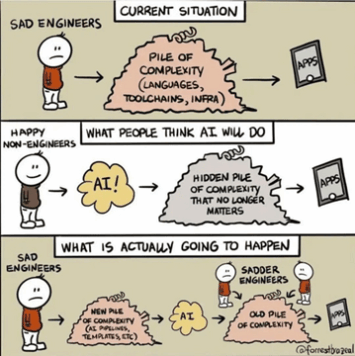
04 Oct America Needs More Engineers…, and Fewer Lawyers
[TLR IS TRAVELING AND APOLOGIZES FOR ANY REPETITIONS IN THE FOLLOWING:]
“‘Due Process’ has made America great. More engineers (and fewer lawyers) could make it even greater.” – The Lonely Realist
America’s government is run by lawyers…, at least it seems that way. America’s founding fathers were law-driven believers in a liberal democratic system, which explains their focus on legal process and fundamental human rights (such as those embodied in the Bill of Rights). Because their beliefs formed the basis for the American experiment, America anchored itself on firm legal ground – the Rule of Law. A consequence is that America’s success has been driven by its successful legal system…, and another consequence is that getting anything done in America requires the engagement of lawyers to manage a plethora of required legal processes…, significantly more so, and more comprehensively, in the 21st Century. That has both advantages and disadvantages.
America lives by its Constitution and the “Due Process” it mandates, as well as by the Rule of Law that underlies it. That’s been America’s differentiator for more than two centuries…, and it has worked extraordinarily well. America has flourished by observing the principles and processes embedded in the Constitution (elaborations of which were provided by the Constitution’s authors in the Federalist Papers). It’s what made America great. It’s the reason why America is history’s most durable democracy and why America has the world’s free-est press, free-est markets and free-est citizens. America’s Rule of Law means that all people, whether inside or outside government, are subject to the same laws and the same legal processes. The Rule of Law requires observance of the principle that the Constitution is supreme and leaders are not – they can be indicted or insulted the same ways as ordinary citizens (there is no lèse-majesté) –, that the laws are applied evenly by prosecutors and judges, and that every person is held accountable for his actions – there are no free passes. Laws are clear, publicized, stable and balanced. They protect fundamental rights, including property, contract and human rights.
Only a relatively few other countries, even if they are democracies, observe the Rule of Law…, none, however, in the same way as America. Many honor their laws only in the breach. For those in power in other countries, the Rule of Law accordingly often serves as a fig leaf. The fact is that senior government officials outside a handful of democracies view themselves as being the law, entitled rulers rather than elected officials. America has strictly adhered to its Constitution and its Rule of Law.
But some are arguing that living by the law no longer makes sense for America in the 21st Century’s increasingly competitive economic environment. They see centralized government management as the better model for today’s realities (that is, Statism)…, and they point to China as an exemplar.
A recently published book, Breakneck: China’s Quest to Engineer the Future, arguably advocates for a better different balancing by contrasting the consequences of America’s “rule by law” and China’s “rule by engineering” and, in doing so, provides a unique perspective on how to view the U.S.-China struggle for global supremacy. Breakneck highlights China’s prioritization of engineering expertise as well as its scorn for legal fairness and individual freedoms. As the author notes, “Americans and Chinese are fundamentally alike: restless, eager for shortcuts, ultimately driving most of the world’s big changes. Their rivalry should not be reasoned through with worn-out terms from the past century like socialist, democratic, or neoliberal. Both countries are tangles of imperfection, regularly delivering — in the name of competition — self-beatings that go beyond the wildest dreams of the other. China is an engineering state, which brings a sledgehammer to problems both physical and social, in contrast with America’s lawyerly society, which brings a gavel to block almost everything, good and bad.”
In its review of Breakneck, The Economist provides a helpful economic perspective: “Many of the people who run China are engineers, and it shows. Since the 1980s China has built a motorway network twice the length of America’s and a high-speed rail network more than 15 times the size of Japan’s. It uses almost as much solar and wind power as the rest of the world combined, and it produces around one-third of the world’s manufactured goods…. [Breakneck‘s author], Dan Wang, argues that China is an ‘engineering state,’ locked in competition with America, which is run by lawyers. China builds things quickly. America debates endlessly about whether they should be built at all. How did China, a country that was once known mostly for intellectual-property theft and child labor, become a technological powerhouse?” Mr. Wang persuasively explains that China‘s unprecedented economic growth builds on an engineering culture, one that ignores freedoms and human rights. He highlights China’s success in developing its infrastructure and manufacturing sector and in becoming a technological powerhouse, but cogently acknowledges China’s painful failures in dealing with overcapacity, increasing national and corporate debt, environmental issues, a self-defeating one-child policy and mishandled COVID response, all of which owe their existence to China’s centralized, authoritarian political system. While Chinese “engineers tend to censor whatever they can’t understand…, [t]he dominance of lawyers in the American elite has helped transmute the United States into a litigious vetocracy.”
Mr. Wang concludes with a warning: in a possible future war between the two countries, China’s engineering state has the advantage, and this needs to be addressed by America. The Economist points out that “[i]n 2022 China had nearly 1,800 ships under construction; America had five. During fierce fighting, Ukrainian forces fired nearly as many artillery shells every two days as America makes in a month…. [Large language model] algorithms alone cannot win battles – they must be embodied in manufactured drones and munitions.” America should be seeking to balance the preservation of America’s unique legal and human rights with increasing its engineering and manufacturing strengths in order to ensure the continued success of the American experiment. It can do so only by emphasizing those democratic strengths while simultaneously sidelining those “vetocracy” weaknesses. Its survival depends on its success in doing so…, as well as the methodology it chooses to use.
Finally (from a good friend)





No Comments